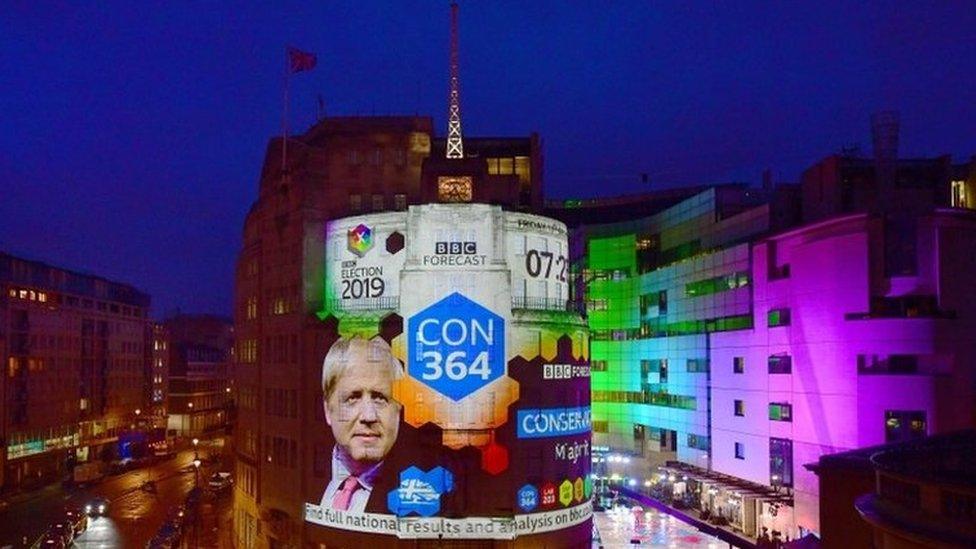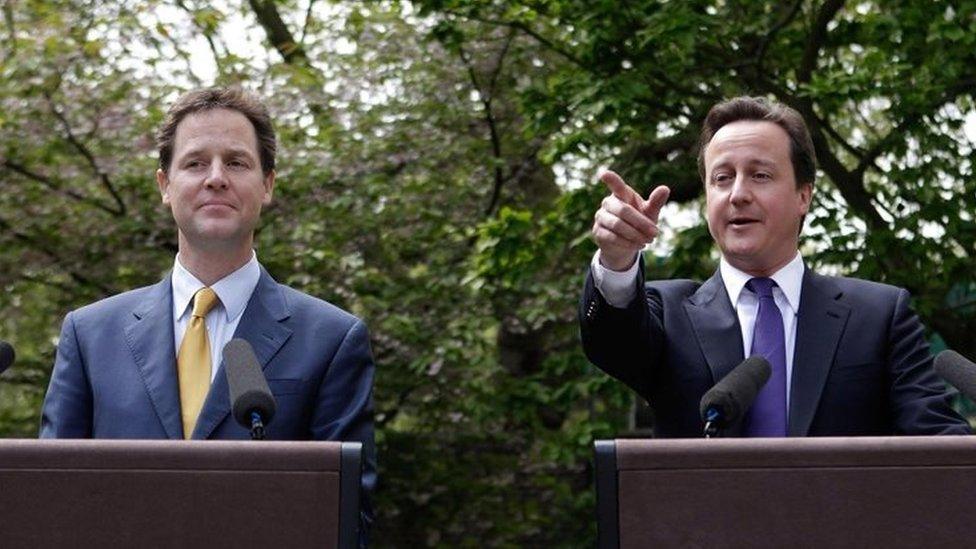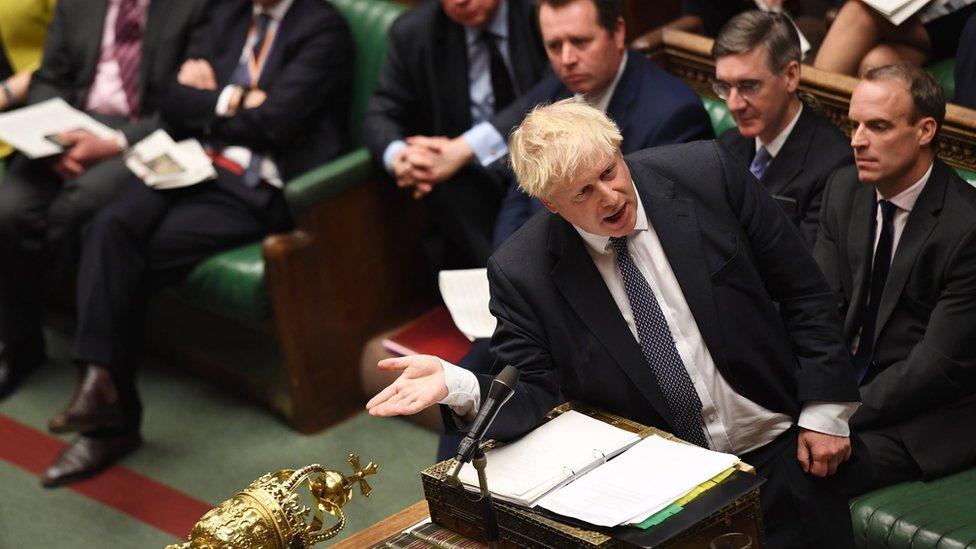Is axing fixed-term parliaments a good idea?
- Published

The BBC forecasted the 2019 result as the polls closed
In the Brexit wars of 2016, Boris Johnson staked his career on a three-word phrase: "Take back control".
Five years on that slogan could easily be applied to one of the prime minister's current goals. He wants to regain the power to trigger early general elections, from Parliament.
In 2011, the Fixed-term Parliaments Act (FTPA) set the length of time between general elections at five years - and transferred the power to call an early election from the prime minister to MPs.
It removed at a stroke what many saw as a big advantage for a sitting prime minister - the ability to choose the best moment to face the electorate. It also ended the traditional media guessing game of when the PM would "go to the country".
But the legislation came in for a lot of criticism from the start.
And late last year the government began the process of repealing the FTPA, accusing it of putting the nation in "paralysis" at the height of Brexit tensions two years ago.
"This bill has a single, clear purpose," then-Deputy Prime Minister Sir Nick Clegg told MPs as he introduced the legislation in 2010.
"For the first time in our history the timing of general elections will not be a play thing of governments."
It was also an insurance policy for his party.

Nick Clegg and David Cameron introduced fixed-term parliaments
As Liberal Democrat advisers hashed out the details of a coalition agreement with their Conservative counterparts in the spring of 2010, they identified a potential pitfall.
'Do the dirty'
They feared that David Cameron could spring a snap election on his coalition colleagues if opinion polls suggested the timing would suit his own party.
"The Fixed-term Parliaments Act was designed to create a commitment between the two political parties," says Polly Mackenzie, chief executive of the Demos think tank and a former adviser to Nick Clegg, who helped draft the coalition agreement.
She says it was there to ensure the parties "would stick it out for the full five years, to make it just a little bit more difficult for the main party to do the dirty on the smaller party".
In that sense, the Act was a success. Despite what many predicted, the coalition government lasted for a full five-year term.
The Liberal Democrats hoped the FTPA would signal the start of further constitutional change.
But the public's resounding rejection of a new voting system in the AV referendum, in 2010, put paid to that.
'Rushed legislation'
And the FTPA remained as the first stage in a series of reforms that never came to be.
Professor Meg Russell, director of University College London's Constitution Unit, says the "legislation was rather rushed".
"It was quite substantially changed in parliament," she says.
"The government took out a whole chunk of the bill while it was in the Lords and replaced it with whole new measures, which therefore didn't have full time for scrutiny and I think that may be where some of the problems come from."
Over the next few years, as the UK became gripped by the Brexit saga, the FTPA failed to do what it said on the tin - in contrast to the coalition years. says Russell.
"It's a bit of a misnomer to call it the Fixed-term Parliaments Act in the first place," says Meg Russell.
"It never actually fixed terms, it always included provisions for there to be early elections and that's what Theresa May used in 2017.
"It said that if she could get a two-thirds majority in the House of Commons for there to be an early election, then there would be an early election. And that happened all perfectly smoothly."
It was in the slow, tumultuous run-up to the 2019 election that the act's critics became louder.

MPs repeatedly blocked Boris Johnson's election ambitions
Three times Boris Johnson asked MPs to back an early general election using the provisions of the Act. Three times MPs refused to comply.
In one tense, late-night Commons debate in September of that year, now-former Conservative MP Sir Alan Duncan placed the political uncertainty squarely at the feet of the coalition government's legislation.
"We all understand why it came into being," he said.
"It was to be the glue in the coalition government after the 2010 election, but it should have had a sunset clause.
"Its effect is now to trammel this government and our prime minister in a very Kafkaesque trap. He is finding it very difficult to govern but is unable to call a general election.
"I very much hope that the first act of the new Parliament will be to abolish the Fixed-term Parliaments Act."
'Good for voters'
Polly Mackenzie says the wider upheaval surrounding the Brexit negotiations, not the FTPA, was to blame for the volatile atmosphere.
"They blamed the Fixed-term Parliaments Act because the Conservative Party wanted to have an election," she says.
"They wanted to have an election whereby they could be confirmed in delivering Brexit because they quite rightly hypothesised that it would play really well for them.
"And they were upset because the Fixed-term Parliaments Act took that power away from them and put it into the hands of the opposition parties."
Boris Johnson did eventually secure an election.
And the publication of the Conservative and Labour manifestos seemed to spell the end for the FTPA - both main parties pledged to repeal the Act.
A cross-party committee of parliamentarians is now reviewing the government's draft replacement for the Act.
Scrapping parts of the bill that some saw as a contributing factor in 2019's election confusion is not seen as being hugely controversial at Westminster.
Last month, constitutional expert Vernon Bogdanor told The Times that giving the power, external to trigger an early election to the prime minister is a good thing for voters.
He said it ensures the government "can function effectively and remain accountable not only to parliament but also the voters".
But Professor Meg Russell says the core argument over whether it should be Parliament or the prime minister that gets to call an early general election is far from over.
"They [the government] are trying to recreate a prerogative power, which is something that lawyers questions whether that's even possible," she says.
"It is possible we might see recommendations that some of the stuff in the Fixed-term Parliaments Act should go, but what you could have is a bill where by a simple majority the House of Commons support is required to endorse an early general election.
"And I think that could be a compromise point which would give the government most of what it wants and also remove some of the aspects of the draft bill that people think are problematic."
Listen to Jack's report on BBC Radio 4's Westminster Hour at 22:00 GMT on Sunday.